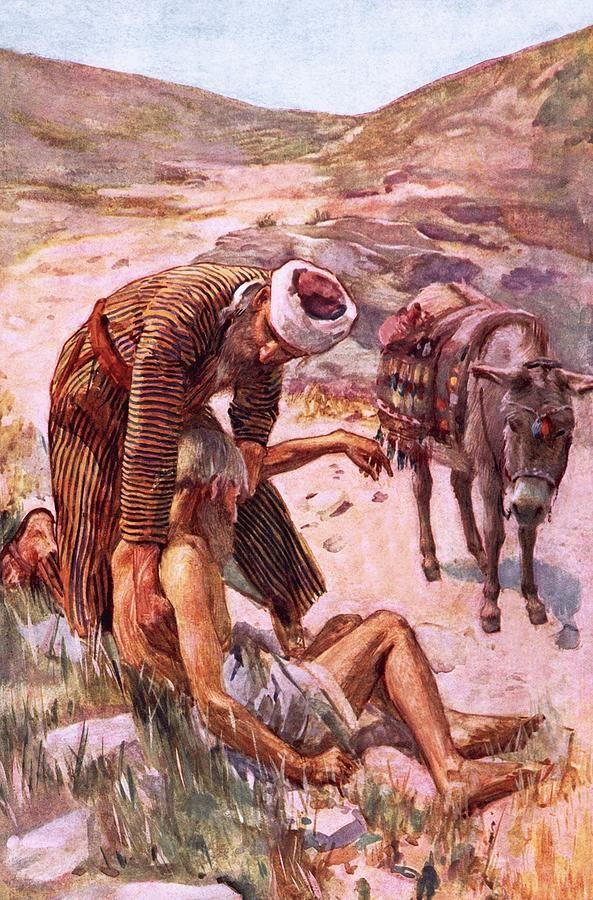The Good Samaritan
Luke 10:25–37 (see also Matt. 22:34–40; Mark 12:28–34)
And behold, a certain lawyer stood up tempting Him, and saying, Teacher, what shall I do to inherit eternal life?
And He said to him, What is written in the Law? How readest thou?
And he answering said, Thou shalt love the Lord thy God out of thy whole heart, and out of thy whole soul, and out of thy whole strength, and out of thy whole mind, and thy neighbor as thyself.
And He said to him, Thou hast answered rightly; this do, and thou shalt live.
But he, desiring to justify himself, said to Jesus, And who is my neighbor?
And Jesus answering said, A certain man came down from Jerusalem to Jericho, and fell among robbers, who having stripped him and having inflicted blows on him went away, leaving him when he was half dead. And by chance, a certain priest came down by that way, and seeing him, passed by on the other side. And likewise also a Levite, when he was at the place, came and saw, and passed by on the other side. But a certain Samaritan, as he journeyed, came upon him, and seeing him, was moved with compassion. And coming near, he bound up his wounds, pouring in oil and wine, and he set him on his own beast of burden, and brought him to an inn, and took care of him. And going out on the morrow, he set out two denarii, gave them to the host, and said to him, Take care of him, and whatever thou spendest more, when I come again, I will repay thee.
Which now of these three thinkest thou was neighbor to him who fell among robbers? And he said, He who did mercy with him. Then Jesus said to him, Go, and do thou likewise.
AE 444:14. [The parable of the good Samaritan] shall here be explained, because it treats of charity towards the neighbor, and because the Lord there spoke from beginning to end by correspondences, which have until now been unknown....
This treats of charity towards the neighbor, and of good works by which charity is in its effect and in its fullness. “Jerusalem” here signifies the church where there is true doctrine, and “Jericho” the church where there are knowledges of truth and good; so the “priest” signifies those who have no love to the Lord, and the “Levite” those who have no charity towards the neighbor, such as those were who were in Jerusalem at that time. But the “Samaritan” signifies the nations [or gentiles] that were in the good of charity.
The “man going down from Jerusalem to Jericho” signifies those who wished to be instructed in the truths and knowledges of the church. The “robbers among whom he fell” signify those in the perverted church, such as the Jewish church was at that time. “They stripped him and smote him, and left him half dead,” signifies that they deprived him of truths and imbued him with falsities, and thus injured him as to [his] spiritual life to such a degree that scarcely any spiritual life remained, “to strip” signifying in the Word to deprive of truths, “to smite” signifying to injure the mind and spiritual life by falsities, and “to be half dead” signifying to be almost destitute of that life.
“To be moved with compassion” signifies mercy and charity from within, mercy and charity also forming a one. “To bind up the wounds and to pour in oil and wine” signifies providing a remedy against the falsities that have injured his life, by instructing him in the good of love and the truth of faith, “oil” in the Word signifying the good of love, and “wine” the good and truth of faith. “To set him on his own beast” signifies according to his understanding so far as he was able, “horse” (in like manner as beast), signifying the understanding. “To lead him to an inn and to take care of him” signifies to lead him to those who are better instructed in the knowledges of good and truth, an “inn” being a place where foods and drinks are bought, which signify the knowledges of good and truth, thence spiritual nourishment which is communicated by instruction. “He gave to the host two denarii, and said to him, Take care of him, and whatever thou spendest more, when I come back again I will repay thee,” signifies all things of charity in the measure of his ability and capacity.
Questions and Comments
- How can we make sure we are not like the priest and the Levite in this story?
- What might be an example of finding a person in the spiritual state represented by man who fell among robbers, or by the Samaritan?
- “‘To bind up the wounds and to pour in oil and wine’ signifies providing a remedy against the falsities that have injured [a person’s] life” (AE 444:14). How might we provide such a remedy?
| previous |  |
next |
|---|


